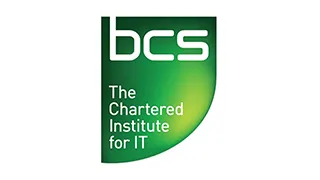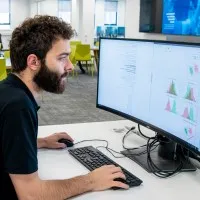Facilities

Software projects laboratory


Enhance your knowledge with a master's in artificial intelligence (AI) at the University of Southampton. Our researchers draw on their own research to offer modules on state-of-the-art fields like computer vision, robotics and machine learning.
You can choose among these to develop the specialist skills you'll need for further study or a career in application development.
This AI master's will give you a solid grounding in traditional artificial intelligence, and you'll study emerging topics like:
We’ll give you access to specialist project labs, computer workstations, and online tools to support your learning in an ideal environment. Our researchers will equip you to handle new and unique challenges in a variety of specialist AI fields. At the end of the course, you’ll be able to design, build, analyse and problem-solve in many areas relating to artificial intelligence.
We also offer a fully online MA Artificial Intelligence. This course is ideal if you want to explore the societal, ethical, and strategic impacts of AI.
We regularly review our courses to ensure and improve quality. This course may be revised as a result of this. Any revision will be balanced against the requirement that the student should receive the educational service expected. Find out why, when, and how we might make changes.
Our courses are regulated in England by the Office for Students (OfS).
Your course leader has research interests in human interaction with robot swarms. Visit Dr Mohammad Soorati’s staff profile to learn more about his work.

“What I enjoy most about my course is the fact that I have been able to choose my modules and shape my course as I wanted it. I have gone down an AI path and selected many Machine Learning and Artificial Intelligence modules.”


This course is based at Highfield.
This qualification is awarded by the University of Southampton.
The Course Description Document details your course overview, your course structure and how your course is taught and assessed.
You’ll need an upper 2:1 degree (with a mark of 65% or above) in one of the following subjects:
You must also have a good 2:1 (65%) score in the following:
Find the equivalent international qualifications for your country.
This programme only accepts applicants who have studied at an X1, X2, X3 or X4 institution.
If English isn't your first language, you'll need to complete an International English Language Testing System (IELTS) to demonstrate your competence in English. You'll need all of the following scores as a minimum:
We accept other English language tests. Find out which English language tests we accept.
If you don’t meet the English language requirements, you can achieve the level you need by completing a pre-sessional English programme before you start your course.
If you don’t meet the academic requirements, you can complete a pre-master's programme through our partnership with OnCampus. Learn more about the programmes available.
Please contact us if you're not sure you have the right experience or qualifications to get onto this course.
Email: enquiries@southampton.ac.uk
Tel: +44(0)23 8059 5000
This is a full-time master’s course. You’ll study for 12 months, from September to the following September.
In the first 9 months (semesters 1 and 2) you’ll study the taught part of your course.
This is made up of modules that everyone on the course takes, and modules we’ll ask you to choose from a list of options. You’ll take exams at the end of both semesters.
You’ll begin preparing for your research project and dissertation during semester 1, and continue this work in semester 2.
For the last 3 months, over the summer, you’ll work independently to research and write your dissertation. You’ll have one-to-one meetings with your supervisor during this time to discuss your progress.
Want more detail? See all the modules in the course.
The modules outlined provide examples of what you can expect to learn on this degree course based on recent academic teaching. As a research-led University, we undertake a continuous review of our course to ensure quality enhancement and to manage our resources. The precise modules available to you in future years may vary depending on staff availability and research interests, new topics of study, timetabling and student demand. Find out why, when and how we might make changes.
You must study the following modules :
This course introduces the fundamental concepts and techniques of artificial intelligence (AI) . This unit aims to give a broad introduction to the rapidly-developing field of AI covering a range of approaches (modern, classical, symbolic, and statisti...
Machine Learning is about extracting useful information from large and complex datasets. The subject is a rich mixture of concepts from function analysis, statistical modelling and computational techniques. The module will cover the fundamental principles...
This module gives a broad introduction to the new and rapidly expanding field of agent-based computing. It introduces the key concepts and models of the field, dealing both with the individual agents and with their interactions. Particular emphasis is pla...
Your research project will enable you to explore in depth some aspect of your specialist subject area. You will be allocated a project supervisor with whom you will meet and agree a project brief and plan. These must be submitted to, and agreed by, ...
Machine Learning is about extracting useful information from large and complex datasets. The module will cover the practical basis of how learning algorithms are can be applied. You will gain hands-on experience in laboratory-bases sessions. Exclusions...
You must also choose from the following modules :
- To introduce key concepts in pattern recognition and machine learning; including specific algorithms for classification, regression, clustering and probabilistic modeling. - To give a broad view of the general issues arising in the application of algor...
This module: - Introduces the students to the key issues of interaction of multiple self-interested parties (a.k.a. agents) and gives a broad survey of topics at the interface of theoretical computer science and game theory dealing with such interactions...
This module lies at the intersection of robotics and biology. Through the abstraction of design principles from biological systems, it is possible to develop a range of core competences, including mechatronic systems, sensor and actuator technologies. By ...
Biometrics is about how we can recognise people automatically, by personal characteristic. We all have fingerprints and faces - and they are unique. We have to sense the information, process it and then deliver an assessment of the identity associated wit...
The challenge of computer vision is to develop a computer based system with the capabilities of the human eye-brain system. It is therefore primarily concerned with the problem of capturing and making sense of digital images. The field draws heavily on ma...
The challenge of data mining is to transform raw data into useful information and actionable knowledge. Data mining is the computational process of discovering patterns in data sets involving methods at the intersection of artificial intelligence, machine...
Deep learning has revolutionised numerous fields in recent years. We've witnessed improvements in everything from computer vision through speech analysis to natural language processing as a result of the advent of massively parallel compute coupled with l...
Deep learning and differentiable programming has revolutionised numerous fields in recent years. We've witnessed improvements in everything from computer vision through speech analysis to natural language processing as a result of the advent of cheap GPGP...
Evolution by natural selection has created amazingly complex and sophisticated solutions to some very difficult problems - how exactly does it achieve this, and how can we harness this capability for engineering artificial systems and computational proble...
This module is useful to introduce: - Image processing and its relation to signal processing. - Image transformations for filtering, coding and etc. - Histogram processing algorithms to enhance image qualities and visibility. - Theories analysing and ...
The last decade and a half have seen the Web move away from a purely document-centric information system to one in which hypertext techniques are applied to the sort of data found in databases; the term “Semantic Web” is used to refer to this Web of linke...
This module gives students an introduction to natural language processing (NLP) algorithms and an understanding of how to implement NLP applications.
This module is about the fundamentals of algorithms solving continuous optimisation problems, which involve minimising functions of multiple real-valued variables, possibly subject to restrictions, constraints, and nondifferentiable regularisations on the...
Computer Science has evolved significantly over the past decades, and various subfields require a strong foundation in probability. Such fondation is important in studying randomized algorithms, algorithm analysis, approximation algorithms and artificial ...
Simulation modelling plays an increasingly significant role across modern science and engineering, with the development of computational models becoming established practice in industry, consulting, and policy formulation. Computer scientists are often em...
We teach most modules through a mixture of lectures, seminars and computer-based practical work. You will enhance your general knowledge of AI and develop key skills in:
You’ll also be able to choose between several diverse topics to suit your interests.
Depending on the modules you take, we'll assess your progress through a mixture of:
This is an opportunity to demonstrate your mastery of all relevant techniques and methods of enquiry. You will carry out a research project lasting 3 to 4 months, assessed by a 15,000-word dissertation.
Your personal tutor will meet you by request to give advice, help you choose modules, and provide general support if you need it. You can talk to your module tutors about any subject-specific questions.
You’ll also meet weekly with a mentor, usually a postgraduate student who has graduated from the course, for extra guidance.
This degree will allow you to develop and evidence subject-specific and targeted employability skills. This includes the required skill set for a range of future careers, further study, or starting your own business.
The skills you can expect to focus on and gain from this course include:
The employability and enterprise skills you'll gain from this course are reflected in the Southampton skills model. When you join us you'll be able to use our skills model to track, plan, and benefit your career development and progress.
Download skills overview
Graduates commonly work in a range of organisations or sectors including:
Manufacturing,
Scientific and Technical,
Water and Waste Management,
Education,
Public Administration,
Defence,
Finance.
*Example graduate job titles and job prospect statistics taken from The Graduate Outcomes Survey, which gathers information about the activities and perspectives of graduates 15 months after finishing their course.

Choosing to do work experience is a great way to enhance your employability, build valuable networks, and evidence your potential. Learn about the different work and industry experience options at Southampton.
We are a top 20 UK university for employability (QS Graduate Employability Rankings 2022). Our Careers, Employability and Student Enterprise team will support you. This support includes:
We have a vibrant entrepreneurship culture and our dedicated start-up supporter, Futureworlds, is open to every student.
Your career ideas and graduate job opportunities may change while you're at university. So it is important to take time to regularly reflect on your goals, speak to people in industry and seek advice and up-to-date information from Careers, Employability and Student Enterprise professionals at the University.
Fees for a year's study:
If you're an international student on a full-time course, we'll ask you to pay £2,000 of your tuition fees in advance, as a deposit.
Your offer letter will tell you when this should be paid and provide full terms and conditions.
Find out about exemptions, refunds and how to pay your deposit on our tuition fees for overseas students page.
Your tuition fee covers the full cost of tuition and any exams. The fee you pay will remain the same each year from when you start studying this course. This includes if you suspend and return.
Find out how to pay your tuition fees.
Accommodation and living costs, such as travel and food, are not included in your tuition fees. There may also be extra costs for retake and professional exams.
Explore:
If you’re a graduate of the University of Southampton, you could be eligible for a 10% discount on your postgraduate tuition fees.
This can help with course fees and living costs while you study a postgraduate master's course. Find out if you're eligible.
A variety of additional funding options may be available to help you pay for your master’s study. Both from the University and other organisations.
Find out about funding you could get as an international student.
For further details of our admission process, read our step by step guide to postgraduate taught applications.
The deadline to apply for this course is Tuesday 9 September 2025, midday UK time.
We advise applying early as applications may close before the expected deadline if places are filled.
The deadline to apply for this course is Tuesday 26 August 2025, midday UK time.
We advise applying early as applications may close before the expected deadline if places are filled.
We’ll ask you to pay a £50 application assessment fee if you’re applying for a postgraduate taught course.
This is an extra one-off charge which is separate to your tuition fees and is payable per application. It covers the work and time it takes us to assess your application. You’ll be prompted to pay when you submit your application which won’t progress until you've paid.
If you're a current or former University of Southampton student, or if you’re applying for certain scholarships, you will not need to pay the fee. PGCE applications through GOV.UK and Master of Research (MRes) degree applications are also exempt. Find out if you’re exempt on our terms and conditions page.
When you apply you’ll need to submit a personal statement explaining why you want to take the course.
You’ll need to include information about:
References are not required for this programme.
Please include the required paperwork showing your first degree and your IELTS English language test score (if you are a non-native English speaker) with your application. Without these, your application may be delayed.
You'll be able to track your application through our online Applicant Record System.
We receive a high volume of applications for this course. This means you may not receive a response to your application for up to 12 weeks.
If we offer you a place, you will need to accept the offer within 30 working days. If you do not meet this deadline, we will offer your place to another applicant.
Unfortunately, due to number of applications we receive, we may not be able to give you specific feedback on your application if you are unsuccessful.
We treat and select everyone in line with our Equality and Diversity Statement.
Please contact us if you're not sure you have the right experience or qualifications to get onto this course.
Email: enquiries@southampton.ac.uk
Tel: +44(0)23 8059 5000


